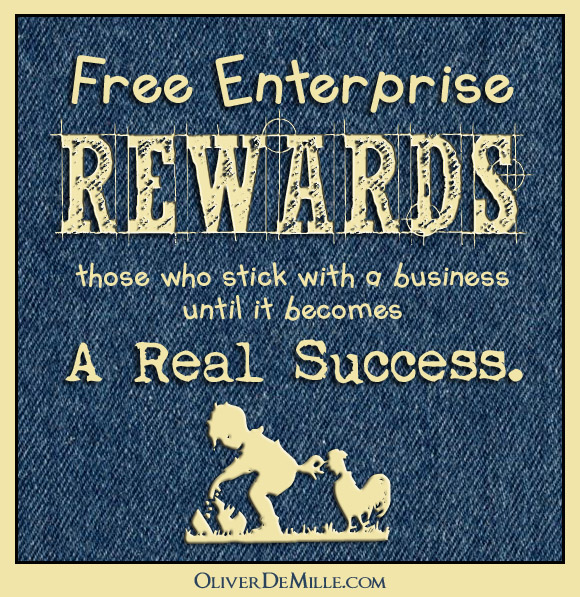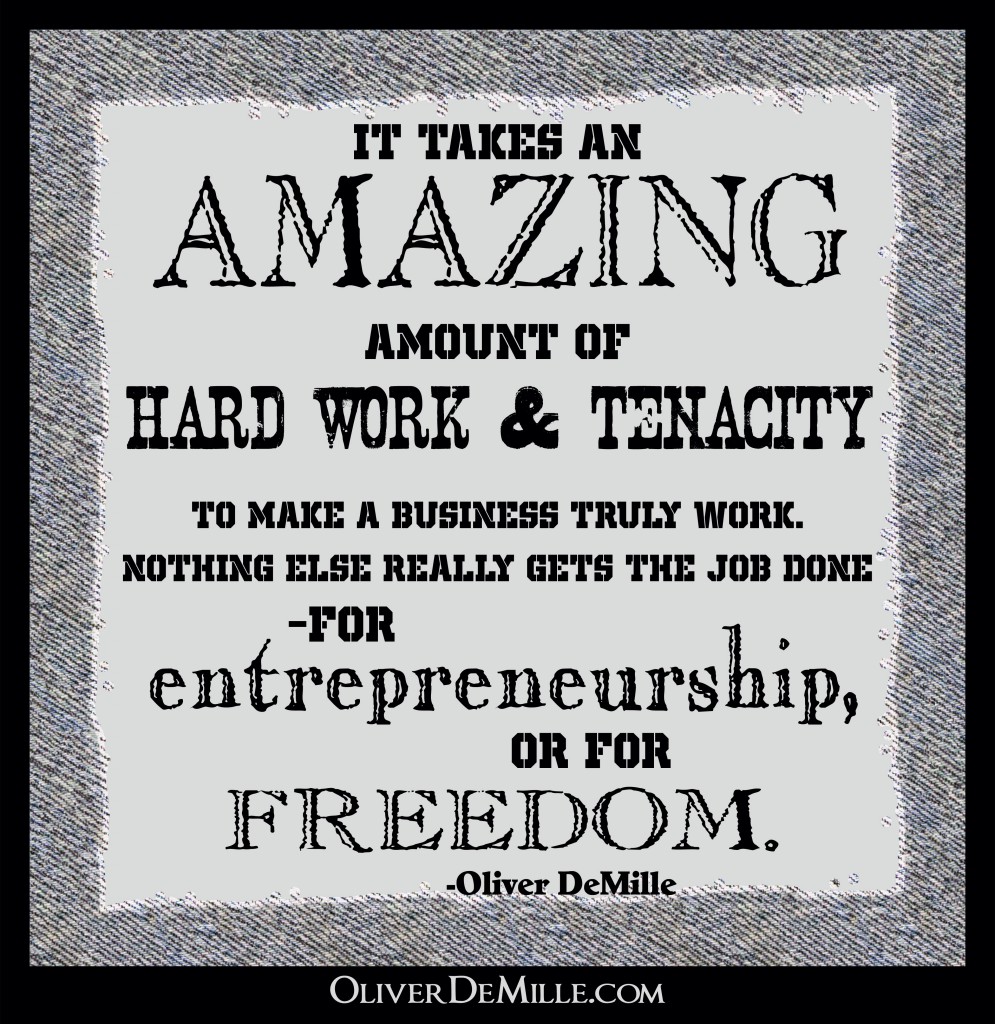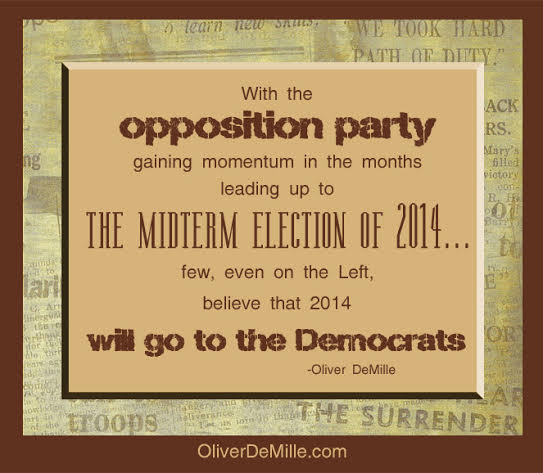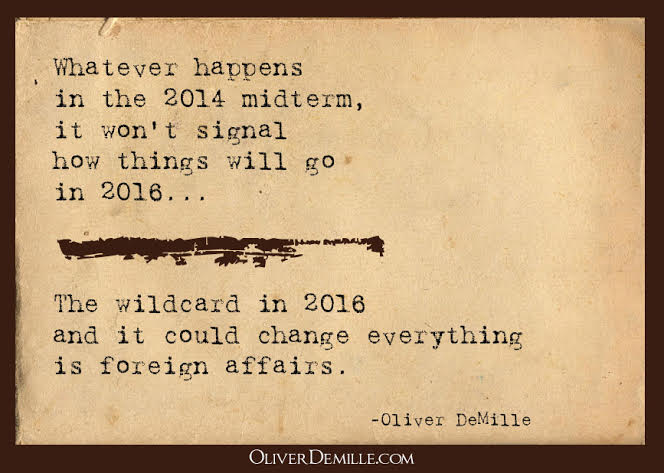A Missing Piece of Entrepreneurship
July 25th, 2014 // 7:38 am @ Oliver DeMille
What Some Entrepreneurs Are Missing
I write a lot about entrepreneurship, even though my main focus is freedom. The reason for this is simple: free nations are always nations with a strong entrepreneurial sector. There are no exceptions in history.
Put simply, the great free nations of human experience had a flourishing free enterprise. This was true in ancient Athens and ancient Israel, the Swiss free era and the Frank golden age, the free periods of the Saracens and also the Anglo-Saxons, the American founding era and the modern free nations of Britain, U.S., Canada, Japan and Europe, among others.
Take away free enterprise, and a nation’s freedom always declines. Shut down the entrepreneurial spirit, and liberty rapidly decreases.
The main reason freedom rises or falls with entrepreneurialism is simple: 1) to succeed as an entrepreneur, a person must exhibit the character traits of initiative, innovation, ingenuity, creativity, wise risk-taking, sacrifice, tenacity, frugality, resilience, and perseverance, and 2) these characteristics are precisely the things that through history have proven necessary for free citizens to stay free.
The Hidden Problem
The large majority of responses when I write about entrepreneurship are thoughtful, insightful, and even wise. But once in a while when I write an article pointing out the importance of free enterprise and entrepreneurship to freedom, I get a strange response. I call it “strange” because it shows that some people don’t quite understand what I mean by entrepreneurship. Such comments go something like this:
“I’m a born entrepreneur, and I’ve started dozens of businesses, so I understand that…”
“I have a list of ideas for successful entrepreneurial projects—could you suggest which of these might be the best options…”
“My spouse is constantly starting entrepreneurial ventures and using up our capital in such schemes, and your article made him want to do several more of them…”
These types of sentences are a real head-scratcher. Why? Because this isn’t what successful entrepreneurship and free enterprise is all about. Not at all.
Successful entrepreneurs typically start 2-4 businesses during their life, not dozens, and at least one of them becomes an important enterprise. The free market just doesn’t reward people who start dozens of businesses, frequently jumping around from business to business.
People who are constantly engaged in their latest “start-up” aren’t really following the entrepreneurial path. They’re just endlessly repeating the first part of it. Free enterprise rewards those who stick with a business until it becomes a real success, or who learn from the mistakes of the past and then stick with the next venture until it truly prospers.
A lot of successful entrepreneurs have had a failure or two, but not many of them have spent their years working on dozens of businesses. They soon learn to pick one and do what it takes to succeed. They buckle down and go through the process of turning their company into something.
In fact, many successful owners have suggested that it takes about 10,000 hours, or even more, to become good enough at a business or economic sector to make it profitable. Those who are constantly jumping around just can’t ever get there.
The Real Thing
When people talk about an entrepreneurial attitude or viewpoint of always starting another business, that’s one thing. But it’s not the same thing as tenaciously persevering until one business flourishes—and then tenaciously persevering as it keeps thriving.
This latter approach is the kind of entrepreneurship that builds a nation. It’s more than just a posture or a habit of starting a bunch of businesses. It’s more than liking the idea of business ownership. It’s more than talking about being your own boss.
It takes an amazing amount of hard work and tenacity to make a business truly work. Nothing else really gets the job done—for entrepreneurship, or for freedom.
This might seem like a little thing, like a meaningless play on words, but it isn’t. It is huge! Entrepreneurship doesn’t spur liberty in a society just because some people have an independent, “I’ll do it myself” or “I’d rather be my own boss” attitude. That’s part of it, but there’s more.
Free enterprise is great when the enterprises work. This happens only when the small business owner pays the price to become a successful leader and make the enterprise blossom and grow.
Again, this might not always occur—and it never comes easily—but the leaders who build a free nation are those who hunker down and do the hard work to make it happen. Even if they fail, they make it happen the next time. One dedicated day at a time. Through all the hard times and challenges. Even when everyone else would have given up.
A nation with a lot of such entrepreneurs has a real chance at freedom.
A nation without them never does.
 Oliver DeMille is the New York Times, Wall Street Journal and USA Today bestselling co-author of LeaderShift: A Call for Americans to Finally Stand Up and Lead, the co-founder of the Center for Social Leadership, and a co-creator of TJEd.
Oliver DeMille is the New York Times, Wall Street Journal and USA Today bestselling co-author of LeaderShift: A Call for Americans to Finally Stand Up and Lead, the co-founder of the Center for Social Leadership, and a co-creator of TJEd.
Among many other works, he is the author of A Thomas Jefferson Education: Teaching a Generation of Leaders for the 21st Century, The Coming Aristocracy, and FreedomShift: 3 Choices to Reclaim America’s Destiny.
Oliver is dedicated to promoting freedom through leadership education. He and his wife Rachel are raising their eight children in Cedar City, Utah
Category : Blog &Business &Citizenship &Community &Culture &Current Events &Economics &Entrepreneurship &Leadership &Liberty &Mini-Factories &Producers &Prosperity
A Huge Surprise! by Oliver DeMille
July 21st, 2014 // 6:09 am @ Sara DeMille
My Eureka Moment
 It was downright amazing! Surprising, in fact. Shocking. Actually, I don’t think the American founding generation would have been surprised at all. They would have expected it. But for me, raised in our modern world, it was a true Eureka!
It was downright amazing! Surprising, in fact. Shocking. Actually, I don’t think the American founding generation would have been surprised at all. They would have expected it. But for me, raised in our modern world, it was a true Eureka!
I should have seen it coming, to tell the truth. In fact, if someone had asked me beforehand to predict what would happen, I’d have put on my forecasting cap and I…probably still wouldn’t have known. But nobody asked, and I didn’t give it a thought. I guess I’m getting ahead of the story, though, so let’s back up a bit.
Petitions and Amazing Happenings
Last summer and fall a number of people in our small town went around getting citizens to sign a petition. The city had decided to raise taxes to meet the growing demands, and some people thought this was a bad idea. The truth is, the leaders in our town are very dedicated and honest—the ones I know personally, which includes most of them, are people of deep integrity.
The same is true of the citizens who talked to me about signing the petition. I studied the issue and decided that, in my opinion, we really didn’t need the additional services the tax increase would cover. I signed the petition.
So did a lot of people, and the taxes were postponed—at least for a while.
Then came the annual 4th of July celebration. Of course, one of the great traditions of Independence Day is watching the fireworks. This was suggested by founding father John Adams, and it has been a ritual of growing up for most Americans ever since.
But fireworks were one of the things cut by postponing the tax increase. As the 4th approached, this became a topic of discussion across back fences, near mailboxes, and anywhere else neighbors met. “I voted against raising taxes,” one neighbor told me, “but I’ll sure miss the fireworks.” He shook his head sadly.
I found myself agreeing with him. I repeated his sentiment several times during the last half of June.
Time passed, as it always does, and the holiday arrived. There was a parade, snow cones, barbecues and races. When evening came, my kids asked if I wanted to drive to the neighboring town and watch the fireworks. I told them to go ahead. On the one hand I felt a bit like a hypocrite for voting against the taxes and then driving to the next town for their tax-funded fireworks. But mostly I was just worn out from the day and wanted to stay home. “If only we could just sit in our yard and watch the fireworks like every year,” I heard my voice saying in spite of myself.
The kids left, and Rachel and I sat in the yard and watched dusk turn into darkness.
Then an amazing thing happened. Our neighbors just down the road begin shooting off amazing fireworks. Because the city wasn’t providing fireworks, policies were relaxed and people were allowed to fire up the kind of fireworks usually only done by the local government.
Firework Economy
We watched in awe. Because our home is on a hill, the bursts seemed close enough to reach out and touch.
But that was just the beginning. Right after the neighbors began their display, another one started just down the road. Then another, and another. We walked the stairs to our balcony and looked out over the valley. Every neighborhood seemed to have the kind of fireworks that in past years have only been done by the city. We counted seventeen distinct places that shot off huge firework displays.
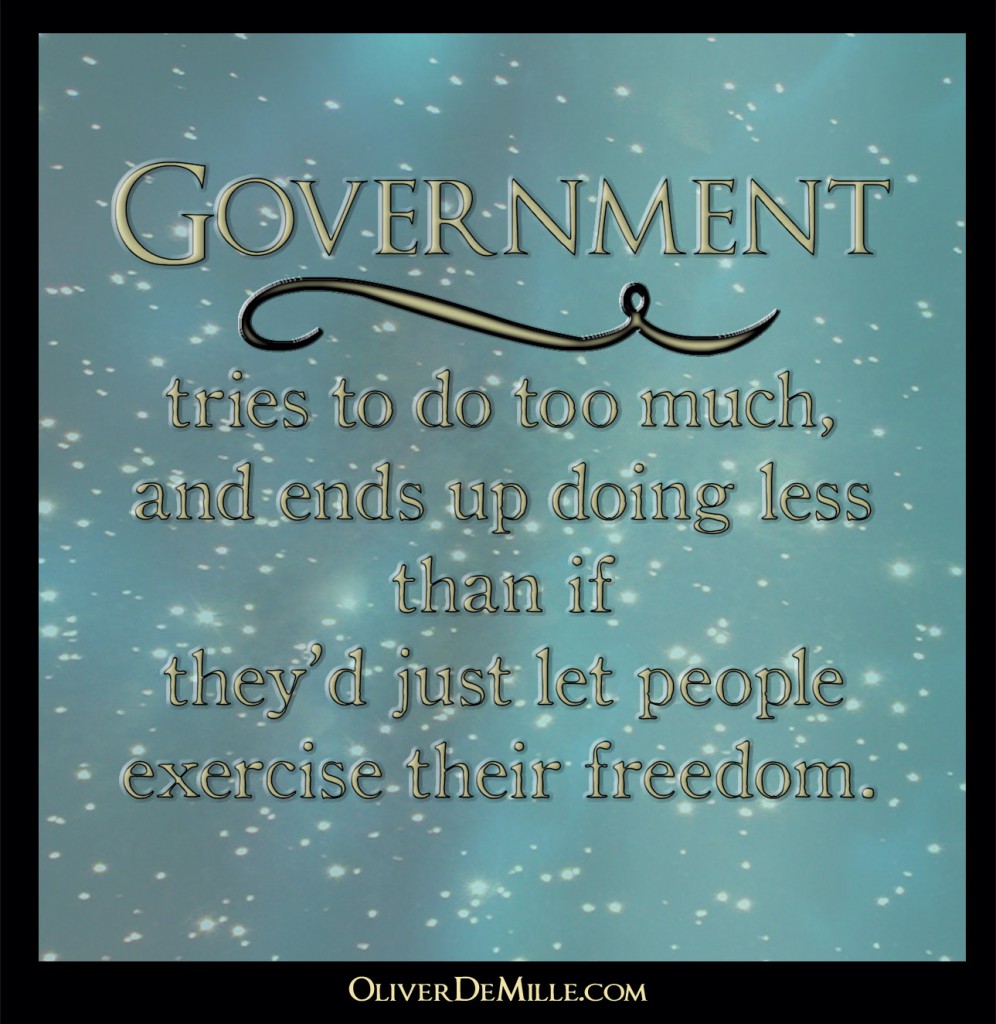 We watched them simultaneously. This went on for over two hours. The city’s usual annual display seemed to last about a half hour or so—I have no idea the actual timing, just my recollection. This one went on and on. An hour into this, three more neighborhoods started. Some ended, and new ones began.
We watched them simultaneously. This went on for over two hours. The city’s usual annual display seemed to last about a half hour or so—I have no idea the actual timing, just my recollection. This one went on and on. An hour into this, three more neighborhoods started. Some ended, and new ones began.
We watched in awe.
It was by far the most amazing fireworks display I’ve ever witnessed. All provided by private citizens. As far as I know, all paid for without tax funds.
As we watched, and as it continued well into the night, I turned to Rachel and said, “I can’t believe it! The city government never did anything close to this! Look at what the people are doing, all by themselves.”
She nodded. “Government tries to do too much,” she said, “and ends up doing less than if they’d just let people exercise their freedom.”
“Can you imagine what would happen to our economy if the government would get out of the way and let free enterprise work?” I asked.
“Instead of standing on a balcony watching the best fireworks ever,” she replied, “we could stand back and watch the nation’s economy boom and blossom. There would be jobs, progress and more prosperity everywhere!”
The One Thing That Works
We sat and watched in silence for a long time. The explosions boomed against each other and echoed through the valley. Sometime close to midnight things died down, and shortly after that our kids came home. They piled out of the van laughing and talking.
“Did you see all that?” our twenty-year-old asked enthusiastically. “That was the best fireworks display ever!”
“We didn’t even leave town!” our seventeen-year-old said. “We started to go, but then all these places started shooting up fireworks. They were everywhere! In every direction…”
“So we just pulled over at the park and got out to watch them!” our fourteen-year-old interrupted. “It was so amazing!”
I looked at Rachel. “Someday the government will get out of the economy and tell the people they’re on their own…and then we’ll see what freedom can really do in America.”
“That’s what you’re here talking about?” asked our twenty-two-year-old daughter with a big smile, baby in arms.
We laughed. “Well, it is the 4th of July” I said. “Isn’t this is exactly what every American should be talking about today?”
Long after the 5th of July arrived I rested on my bed, eyes open, unable to sleep. One thought just kept coming back to me, over and over.
Freedom works.
Today’s America should give it more of a try. Deregulate and let free enterprise shine and flourish. Most people today probably can’t even imagine it, but I bet it’s amazing what the people of this nation would rise up and do if given the chance.
Freedom works.
America should try it…
 Oliver DeMille is the New York Times, Wall Street Journal and USA Today bestselling co-author of LeaderShift: A Call for Americans to Finally Stand Up and Lead, the co-founder of the Center for Social Leadership, and a co-creator of TJEd.
Oliver DeMille is the New York Times, Wall Street Journal and USA Today bestselling co-author of LeaderShift: A Call for Americans to Finally Stand Up and Lead, the co-founder of the Center for Social Leadership, and a co-creator of TJEd.
Among many other works, he is the author of A Thomas Jefferson Education: Teaching a Generation of Leaders for the 21st Century, The Coming Aristocracy, and FreedomShift: 3 Choices to Reclaim America’s Destiny.
Oliver is dedicated to promoting freedom through leadership education. He and his wife Rachel are raising their eight children in Cedar City, Utah
Category : Blog &Citizenship &Community &Current Events &Economics &Entrepreneurship &Government &Leadership &Liberty &Politics &Prosperity
The Achilles of 2016 by Oliver DeMille
July 16th, 2014 // 9:08 am @ Oliver DeMille
Setting the Stage
When Barack Obama was elected in 2008, Republicans went into retreat. Pundits wondered if they’d ever recover, especially after the reversals they’d already experienced in the election of 2006. Some spoke in lasting terms, suggesting that Republicans had become a regional party at best.
Then came the historic Republican victory of 2010, a midterm election that put the GOP in charge of the House and gave it major gains in the Senate. It seemed that a reversal had come at last. A number of conservatives predicted continued victories in the 2012 election and projected that President Obama’s days in the White House were numbered.
With the opposition party gaining momentum in the months leading up to the midterm election of 2014, a number of politicos are forecasting another Republican sweep—some on a major scale that wins control of the entire Congress, others of a smaller but still respectable victory Few, even on the Left, believe that 2014 will go to the Democrats.
In this environment, some on the Right are vocally enthusiastic about the 2016 Presidential election. One elected official said he now thinks Mitt Romney will run again and win, and he has been widely quoted by a number of conservatives hoping for a major change in the White House.
The Common Wisdom
Thoughts about the 2016 election seem to split by geography. Talk to people in most red states, and they’re sure Romney or some other Republican will win this time. In blue states, the opposite is true, and Hillary Clinton is extremely popular. The mainstream media overwhelmingly leans in the direction of “Hillary is the clear front runner,” and most of the alternative (largely conservative) media is hesitant to pick a winner this early—meaning it too thinks Hillary has a lead.
The common wisdom now seems to agree on several things:
- Republicans will likely post some gains in the midterm election in November, but whether these are large or small it won’t have a huge impact on federal policy. The White House will block any drastic changes, and maintain its current agenda, albeit stifled a bit. Voters aren’t likely to see any real change of direction.
- Whatever happens in the 2014 midterm, it won’t signal how things will go in 2016. The 2006 and 2008 elections went in the same direction, but the 2008 and 2010 elections went down totally different tracks. We won’t know what’s going to happen in 2016 until it does.
- Hillary Clinton is definitely ahead right now, and 2016 is her election to lose. All indications are that, regardless of who the Republican nominee is, the strongly blue and red states will vote as expected, and the election will come down to the votes of Hispanics, women, and independents in a few swing states. Hillary will win big with the first two, and probably post a less spectacular win with the third as well.
The Unrest
The wildcard in 2016—and it could change everything—is foreign affairs. On the surface, this should be a strength for Hillary, who traveled widely as the First Lady and both shaped policy and set travel records as Secretary of State. But something deeper is at play. If world events continue to heat up, it could weaken Mrs. Clinton.
Many Americans see Putin’s antics and Syria thumbing its nose at the United States as direct failures of the Obama Administration, not to mention the growing sense that China is replacing us as the up and coming power in the world. Many Americans see Clinton’s role as Secretary of State as partly responsible for these very problems—or for not more effectively addressing them.
Watching rockets rain down on Israel is the worst possible optic for the future of the Democratic Party. (Of course, this is a much bigger issue than American politics, but it matters deeply how America uses its influence in such situations.) If the international incidents continue, or repeat or escalate at any point close to the 2016 election, many voters (most importantly the swing voters) will increasingly see Democratic leadership as weak, naïve and misguided, and yearn for a “strong” Republican-style leader who brings America back to its rightful place in the world.
If Benjamin Netanyahu were running for president in such an environment, it might be a Reaganesque sweep. It would have been fertile ground for Chris Christie, but Bridgegate may have put an end to his viability as the nominee. International unrest could easily increase support for iconic Republican leaders like Mitt Romney, Jeb Bush, et al. Romney may well consider another run on such grounds.
In fact, the current level of international unrest could have a huge influence on which Republicans (and even Democrats) ultimately run and who wins. Rand Paul is very popular among Republicans, for example, except when he starts talking about national security in what many of his base consider isolationist terms. And Christie might look better to voters in the face of a serious international threat.
The Outcome
In the famous Nixon-Kennedy presidential debate, the large majority of those who listened on the radio thought Nixon had won. Those who watched on television, however, thought Kennedy had the clear upper hand. He looked cool, calm, and excited about the future of America, while Nixon looked driven and frustrated. Obviously, Kennedy won the election.
The 2016 election will likely provide similarly interesting optics. How will Hillary and her opponent look on camera, compared to each other? This may be the true swing-point of the election.
But there is another possibility. What if the picture foremost in American minds at the time of the debates and election day includes a major national security issue? If China becomes more aggressive, or rockets are raining down on Israel, or anything similar, a Republican “tear down this wall” moment might sway the whole thing.
In our current world, this is not just possible but very possible. A candidate can’t count on it, but a front runner can’t be sure it won’t happen either.
 Oliver DeMille is the New York Times, Wall Street Journal and USA Today bestselling co-author of LeaderShift: A Call for Americans to Finally Stand Up and Lead, the co-founder of the Center for Social Leadership, and a co-creator of TJEd.
Oliver DeMille is the New York Times, Wall Street Journal and USA Today bestselling co-author of LeaderShift: A Call for Americans to Finally Stand Up and Lead, the co-founder of the Center for Social Leadership, and a co-creator of TJEd.
Among many other works, he is the author of A Thomas Jefferson Education: Teaching a Generation of Leaders for the 21st Century, The Coming Aristocracy, and FreedomShift: 3 Choices to Reclaim America’s Destiny.
Oliver is dedicated to promoting freedom through leadership education. He and his wife Rachel are raising their eight children in Cedar City, Utah
Category : Blog &Citizenship &Community &Culture &Current Events &Government &Leadership &Liberty &Politics
The Three Economies by Oliver DeMille
July 11th, 2014 // 9:42 am @ Oliver DeMille
The Hidden Economy
 There are three economies in modern society. They all matter. But most people only know about two of them. They know the third exists, in a shadowy, behind-the-scenes way that confuses most people. But the first two economies are present, pressing, obvious. So people just focus on these two.
There are three economies in modern society. They all matter. But most people only know about two of them. They know the third exists, in a shadowy, behind-the-scenes way that confuses most people. But the first two economies are present, pressing, obvious. So people just focus on these two.
A couple of recent conversations brought these economies even more to the forefront of my thinking. First, I was meeting with an old friend, touching base about the years since we’d talked together. He mentioned that his oldest son is now in college, and how excited he is for his son’s future. I asked what he meant, and he told me an interesting story.
Over twenty years ago he ran into another of our high school friends while he was walking into his community college admin building. The two greeted each other, and they started talking. My friend told his buddy that he was there to dis-enroll from school. “I just can’t take this anymore,” he told him. “College is getting me nowhere.”
“Well, I disagree,” his buddy said. “I’m here to change my major. I’m going to get a teaching credential and teach high school. I want a steady job with good benefits.”
A Tale of Two
Fast forward almost thirty years. My friend ran into his old buddy a few weeks ago, and asked him what he’s doing. “Teaching high school,” he replied.
“Really? Well, you told me that was your plan. I guess you made it happen. How much are you making, if you don’t mind me asking?”
When his friend looked at him strangely, he laughed and said, “I only ask because you told me you wanted a steady job with good benefits, and I wanted to get out of school and get on with real life. Well, I quit school that day, but I’m still working in a dead end job. Sometimes I wonder what I’d be making if I had followed you into the admin building that day and changed majors with you.”
After a little more coaxing, the friend noted that he was making about $40,000 a year—even with tenure and almost thirty years of seniority. “But it’s steady work, like I hoped. Still, I’ve got way too much debt.”
After telling me this story, my friend looked at me with what can only be described as slightly haunted eyes. “When he told me he makes $40K a year, I just wanted to scream,” my friend said.
“Why?” I asked.
He could tell I didn’t get what he was talking about, so he sighed and looked me right in the eyes. “I’ve worked 40 to 60 hour weeks every month since I walked off that campus,” he told me. “And last year I made about $18,000 working for what amounts to less than minimum wage in a convenience store. I should have stayed in college.”
That’s the two economies. One goes to college, works mostly in white-collar settings, and makes from thirty thousand a year up to four times that. Some members of this group go on to professional training and make a bit more. The other group, the second economy, typically makes significantly less than $50,000 a year, often half or a third of this amount, and frequently wishes it had made different educational choices.
The people in these two economies look at each other strangely, a bit distrustfully, wondering what “could have been” if they’d taken the other path.
That’s the tale of two economies.
II.
Which brings me to my point. Ask members of either economy for advice about education and work, and they’ll mostly say the same thing. “Get good grades, go to college, get a good career. Use your educational years to set yourself up for a steady job with good benefits.” This is the advice my grandfather gave my father at age twenty, and the same counsel my dad gave me after high school. Millions of fathers and mothers have supplied the same recommendations over the past fifty years.
This advice makes sense if all you know are the two economies. Sadly, the third economy is seldom mentioned. It is, in fact, patently ignored. Or quickly discounted if anyone is bold enough to bring it up.
A second experience illustrates this reality. I recently visited the optometrist to get a new prescription for glasses. During the small talk, he mentioned that his younger grandchildren are in college, but scoffed that it was probably a total waste of time. “All their older siblings and cousins are college graduates,” he said, “and none of them have jobs. They’ve all had to move back home with their parents.”
He laughed, but he seemed more frustrated than amused. “It’s the current economy,” he continued. “This presidential administration has been a disaster, and it doesn’t look like anyone is going to change things anytime soon. I don’t know what these kids are supposed to do. They have good degrees—law, accounting, engineering—but they can’t find jobs. Washington has really screwed us up.”
I nodded, and brought up the third economy, though I didn’t call it that. What I actually said was: “There are lots of opportunities in entrepreneurship right now.” He looked at me like I was crazy. Like maybe I had three heads or something. He shook his head skeptically.
“Entrepreneurship is hard work,” I started to say, “but the rewards of success are high and…”
He cut me off. Not rudely, but like he hadn’t really heard me. That happens a lot when you bring up the third economy.
“No,” he assured me, “college is the best bet. There’s really no other way.”
I wasn’t in the mood to argue with him, so I let it go. But he cocked his head to one side in thought and said, slowly, “Although…” Then he shook his head like he was discounting some thought and had decided not to finish his sentence.
“What?” I asked. “You looked like you wanted to say something.”
“Well,” he paused…then sighed. I kept looking at him, waiting, so he said, “The truth is that one of my grandsons didn’t go to college.” He said it with embarrassment. “Actually, he started school, but then dropped out in his second year. We were all really worried about him.”
A “Real” Job
He paused again, and looked at me a bit strangely. I could tell he wanted to say more, but wasn’t quite sure how to go about it.
“What happened?” I prompted.
“To tell you the truth, I’m not really sure. He started a business. You know, one of those sales programs where you build a big group and they buy from you month after month. Anyway, he’s really doing well. He paid off his big house a few years ago—no more mortgage or anything. He has nice cars, all paid for. And they travel a lot, just for fun. They fly chartered, real fancy. He and his wife took us and his parents to Hawaii for a week. He didn’t even blink at the expense.”
“That’s great,” I told him. “At least some people are doing well in this economy.”
He looked at me with that strange expression again. “I’m not sure what to make of it,” he said. “I keep wondering if he’s going to finish college.”
I was surprised by this turn of thought, so I asked, “So he can get a great education, you mean? Read the classics? Broaden his thinking?”
He repeated the three heads look. “No. He reads all the time—doesn’t need college for that. I want him to go back to college so he can get a real job.”
I laughed out loud. A deep belly laugh, it was so funny. I didn’t mean to, and I immediately worried that I would offend him, but he grinned. Then he shook his head. “I know it’s crazy, but I just keep worrying about him even though he’s the only one in the family who is really doing well. The others are struggling, all moved back in with their parents—spouses and little kids all in tow. But they have college degrees, so I keep thinking they’ll be fine. But they’re not. They’re drowning in student debts and a bunch of other debts. It just makes no sense.”
America Needs to Get It
He sighed and talked bad about Washington again. Finally he said, “I’ve poured so much money into helping those kids go to college, and now the only one who has any money to raise his family is the one who dropped out. It just doesn’t make any sense.” He kept shaking his head, brow deeply furrowed.
I left his office thinking that he’s so steeped in the two economies he just doesn’t really believe the third economy exists. He just doesn’t buy it, even when all the evidence is right there in front of him.
He’s not alone. The whole nation—most of today’s industrialized nations, in fact—are right there with him. We believe in the two economies, high school/blue collar jobs on the one hand, and college/white collar careers on the other. Most people just never quite accept that the entrepreneurial economy is real.
It’s too bad, because that’s where nearly all the current top career and financial opportunities are found. The future is in the third economy, for those who realize it and get to work. If you’ve got kids, I hope you can see the third economy—for their sake. Because it’s real, and it’s here to stay.
The first two economies are in major decline, whatever the so-called experts claim. Alvin Toffler warned us in his bestseller FutureShock that this was going to happen, and so did Peter Drucker, back when they first predicted the Information Age. Now it’s happening.
I hope more of us realize the truth before it’s too late. Because China gets it. So does India, and a bunch of other nations. The longer we take to get real and start leading in the entrepreneurial/innovative economy (the real economy, actually), the harder it will be for our kids and grandkids. The third economy will dominate the twenty-first century. It already is, in fact. Whether we’ve chosen to see it yet or not.
 Oliver DeMille is the New York Times, Wall Street Journal and USA Today bestselling co-author of LeaderShift: A Call for Americans to Finally Stand Up and Lead, the co-founder of the Center for Social Leadership, and a co-creator of TJEd.
Oliver DeMille is the New York Times, Wall Street Journal and USA Today bestselling co-author of LeaderShift: A Call for Americans to Finally Stand Up and Lead, the co-founder of the Center for Social Leadership, and a co-creator of TJEd.
Among many other works, he is the author of A Thomas Jefferson Education: Teaching a Generation of Leaders for the 21st Century, The Coming Aristocracy, and FreedomShift: 3 Choices to Reclaim America’s Destiny.
Oliver is dedicated to promoting freedom through leadership education. He and his wife Rachel are raising their eight children in Cedar City, Utah
Category : Blog &Business &Citizenship &Community &Culture &Current Events &Economics &Education &Entrepreneurship &Generations &Leadership &Mini-Factories &Statesmanship
Three Trends vs. Freedom by Oliver DeMille
July 2nd, 2014 // 12:57 am @ Oliver DeMille
Rewriting the Future
 There are at least three great political-economic changes that have occurred in the United States in the last twenty years. Each is rewriting what our world and future looks like, and each is causing a decline of freedom. But none of them are inevitable.
There are at least three great political-economic changes that have occurred in the United States in the last twenty years. Each is rewriting what our world and future looks like, and each is causing a decline of freedom. But none of them are inevitable.
The first trend is the huge growth of government, including government size, spending, and regulation in so many parts of our lives. The second is the major decline of success and opportunity for the middle class. The third is the increasingly important rise of China.
Put these three together, and the future seems bleak to many Americans—even if they aren’t sure why.
The irony is that the first two trends are, in fact, related. Despite what many in Washington say, the massive growth of government is at least contributing to—and may be the main cause of—the growing middle class squeeze.
Breaking the American Dream
Sadly, too many in government don’t see it that way. For some reason, a lot of people witness the deepening plight of the middle class and, inconceivably, think that the only solution is bigger and bigger government. More programs, more spending, more intervention, more regulation.
Yet the historical record is clear. Every major growth of the U.S. government has been followed by a decrease in the middle-class standard of living. Today, after over sixty years of unprecedented expansion of government, the average adult American worker can no longer provide a quality standard of living for a family. In fact, two working adults in a family seldom make ends meet.
Families are smaller, the American Dream of home ownership is switching to a European model of rentals, and more people are joining the lower classes—where family debt or government money, or both, are necessary to get by.
In fact, home ownership, once a staple of middle class lifestyle, is increasingly a financial burden on many people (see “Americans think owning a home is better for them than it is,” The Washington Post, April 21, 2014). In an article entitled “The American Middle Class Is No Longer the World’s Richest” (April 22, 2014), The New York Times reported that the U.S. middle class is getting poorer and as a result “most American families are paying a steep price for high and rising income inequality.”
Middle Going Down
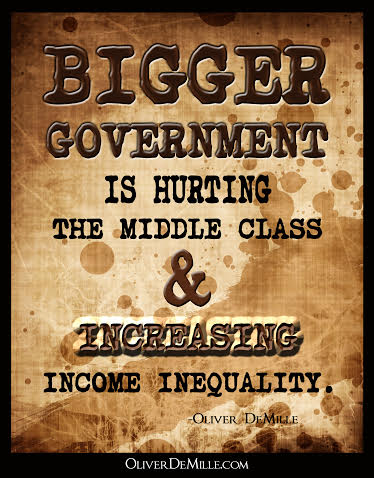 The middle class young are being hit especially hard. Over 40% of today’s Millennial Generation young people move back home after leaving for college or work. As a group, they are the first generation since World War II to be significantly worse off financially than their parents. They aren’t buying cars, they aren’t buying houses, and they aren’t getting married; they’re living at home, hoping something will change in the economy to bring more opportunity (see Paul Taylor, CBS This Morning, April 26, 2014).
The middle class young are being hit especially hard. Over 40% of today’s Millennial Generation young people move back home after leaving for college or work. As a group, they are the first generation since World War II to be significantly worse off financially than their parents. They aren’t buying cars, they aren’t buying houses, and they aren’t getting married; they’re living at home, hoping something will change in the economy to bring more opportunity (see Paul Taylor, CBS This Morning, April 26, 2014).
Speaking of the American middle class, Harvard’s Lawrence Katz wrote: “In 1960, we were massively richer than anyone else. In 1980, we were richer. In the 1990s, we were still richer.” Today we aren’t (op cit. “The American Middle Class…”).
A simple comparison of low regulation in 1960 to increased but still (by today’s standards) low regulation in 1980, then increasing regulation in the 1990s and massive regulatory increases between 2000 and today show a clear pattern: when we raise regulation and grow government, we hurt the middle class and grow the lower class.
Yet many experts suggest that the solution is more, not less, government intervention, programs, spending, and regulation (see ibid). This mirrors the old quip that “the beatings will continue until the morale improves,” except in this case “economy- and innovation-killing regulation will increase until the economy improves.” In reality, the opposite is occurring—bigger government is hurting the middle class and increasing income inequality.
The Choice
Whatever the experts think, the American people have a deep sense that something is wrong. Approximately 70 percent don’t believe America is on the right track (ibid).
This doesn’t translate directly to elections, however. A lot of people think that government is the solution to our economic problems, not the cause of some of our deepest challenges.
If current trends continue, China’s increasingly competitive economy will make a reality of what many in the American middle class now believe: that our children and grandchildren will face a declining standard of living while the same generations in China will see major economic increases.
Like a George Orwell satire, we continue to do exactly what causes more problems. Yet perhaps the greatest American contribution to history—a deep belief in and commitment to moral freedom and free enterprise—goes mostly unheeded. America needs to give its own greatest export (freedom) a try.
Freedom works, as we have shown for over two centuries. Whether America declines or flourishes in the 21st Century will be directly attached to whether we choose bigger government or increased freedom. And it’s up to the middle class to make this decision and make it stick.
 Oliver DeMille is the New York Times, Wall Street Journal and USA Today bestselling co-author of LeaderShift: A Call for Americans to Finally Stand Up and Lead, the co-founder of the Center for Social Leadership, and a co-creator of TJEd.
Oliver DeMille is the New York Times, Wall Street Journal and USA Today bestselling co-author of LeaderShift: A Call for Americans to Finally Stand Up and Lead, the co-founder of the Center for Social Leadership, and a co-creator of TJEd.
Among many other works, he is the author of A Thomas Jefferson Education: Teaching a Generation of Leaders for the 21st Century, The Coming Aristocracy, and FreedomShift: 3 Choices to Reclaim America’s Destiny.
Oliver is dedicated to promoting freedom through leadership education. He and his wife Rachel are raising their eight children in Cedar City, Utah
Category : Aristocracy &Blog &Citizenship &Community &Current Events &Generations &Government &History &Leadership &Liberty &Mission &Politics &Statesmanship

